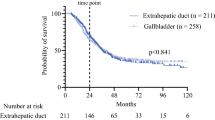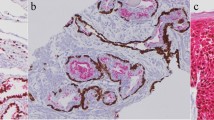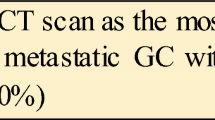Abstract
Background
Carcinoma of unknown primary with a “gastrointestinal profile” is an emerging, favorable entity. Distinguishing this entity is of increasing significance given the progress in the treatment of colorectal cancer.
Patients and methods
74 carcinoma of unknown primary (CUP) patients with CDX2+ tumors were chosen from the databases at M.D. Anderson and Sarah Cannon Cancer Centers between 2004 and 2010. Data on clinical and pathological characteristics including therapy and survival were recorded.
Results
20 patients had ascites on presentation; the predominant sites of metastases included liver (30 %), carcinomatosis (50 %), and nodes (51 %). Based on immunohistochemistry, 2 cohorts were created: Cohort 1—“consistent with lower GI profile” included 34 patients [CDX-2+, CK20+, CK7−] and Cohort 2—“probable lower GI profile” included 40 patients [CDX2+, irrespective of CK7/CK20 status]. Excluding 6 outliers, Cohorts 1 and 2 had 32 and 36 patients, respectively; their median survivals were 37 and 21 months, respectively. On multivariate Cox regression analysis, only liver metastases were found to negatively influence survival.
Conclusions
Our retrospective study provides encouraging indications that CUP patients with gastrointestinal profiles benefit from site-specific therapy. We recommend all CUP patients, especially those with abdominal nodes, isolated carcinomatosis or liver metastases, to undergo optimal immunohistochemistry (IHC) to check for a gastrointestinal profile of CUP.


Similar content being viewed by others
References
Reco FA, Oien K, Erlander M et al (2012) Cancer of unknown primary: progress in the search for improved and rapid diagnosis leading toward superior patient outcomes. Ann Oncol 23:298–304
Varadhachary GR (2011) Carcinoma of unknown primary: focused evaluation. J Natl Compr Canc Netw 12:1406–1412
Varadhachary GR, Raber MN, Matamoros A et al (2008) Carcinoma of unknown primary with a colon-cancer profile-changing paradigm and emerging definitions. Lancet Oncol 9:596–599
Hainsworth JD, Schnabel CA, Erlander MG et al (2012) A retrospective study of treatment outcomes in patients with carcinoma of unknown primary site and a colorectal cancer molecular profile. Clin Colorectal Cancer 11(2):112–118
Rubin BP, Skarin AT, Pisick E et al (2001) Use of cytokeratins 7 and 20 in determining the origin of metastatic carcinoma of unknown primary, with special emphasis on lung cancer. Eur J Cancer Prev 10:77–82
Barbareschi M, Murer B, Colby TV et al (2003) CDX-2 homeobox gene expression is a reliable marker of colorectal adenocarcinoma metastases to the lungs. Am J Surg Pathol 27:141–149
Park SY, Kim BH, Kim JH et al (2007) Panels of immunohistochemical markers help determine primary sites of metastatic adenocarcinoma. Arch Pathol Lab Med 131:1561–1567
Chu PG, Chung L, Weiss LM et al (2011) Determining the site of origin of mucinous adenocarcinoma: an immunohistochemical study of 175 cases. Am J Surg Pathol 35(12):1830–1836
Roy S, Smith MA, Cieply KM et al (2012) Primary bladder adenocarcinoma versus metastatic colorectal adenocarcinoma: a persisting diagnostic challenge. Diagn Pathol 7:151. doi:10.1186/1746-1596-7-151
Bayrak R, Haltas H, Yenidunya S (2012) The value of CDX2 and cytokeratins 7 and 20 expression in differentiating colorectal adenocarcinomas from extraintestinal gastrointestinal adenocarcinomas: cytokeratin 7−/20+ phenotype is more specific than CDX2 antibody. Diagn Pathol 23(7):9. doi:10.1186/1746-1596-7-9
Werling RW, Yaziji H, Bacchi CE et al (2003) CDX2, a highly sensitive and specific marker of adenocarcinomas of intestinal origin: an immunohistochemical survey of 476 primary and metastatic carcinomas. Am J Surg Pathol 27(3):303–310
Dennis JL, Hvidsten TR, Wit EC et al (2005) Markers of adenocarcinoma characteristic of the site of origin: development of a diagnostic algorithm. Clin Cancer Res 11:3766–3772
Tothill RW, Kowalczyk A, Rischin D et al (2005) An expression-based site of origin diagnostic method designed for clinical application to cancer of unknown origin. Cancer Res 65:4031–4040
Horlings HM, van Laar RK, Kerst JM et al (2008) Gene expression profiling to identify the histogenetic origin of metastatic adenocarcinomas of unknown primary. J Clin Oncol 26:4435–4441
Varadhachary GR, Talantov D, Raber MN et al (2008) Molecular profiling of carcinoma of unknown primary and correlation with clinical evaluation. J Clin Oncol 26:4442–4448
Varadhachary GR, Spector Y, Abbruzzese JL et al (2011) Prospective gene signature study using microRNA to identify the tissue of origin in patients with carcinoma of unknown primary. Clin Cancer Res 17(12):4063–4070 Epub 2011 Apr 29
Greco FA, Spigel DR, Yardley DA et al (2010) Molecular profiling in unknown primary cancer: accuracy of tissue of origin prediction. Oncologist 15(5):500–506 Epub 2010 Apr 28
Conflict of interest
John Hainsworth received a research grant from Biotheranostics; Gauri Varadhachary, FA Greco, Wei Qiao, Martin Raber, Siddarth Karanth and Heather Carlson have no conflict of interest.
Author information
Authors and Affiliations
Corresponding author
About this article
Cite this article
Varadhachary, G.R., Karanth, S., Qiao, W. et al. Carcinoma of unknown primary with gastrointestinal profile: immunohistochemistry and survival data for this favorable subset. Int J Clin Oncol 19, 479–484 (2014). https://doi.org/10.1007/s10147-013-0583-0
Received:
Accepted:
Published:
Issue Date:
DOI: https://doi.org/10.1007/s10147-013-0583-0




